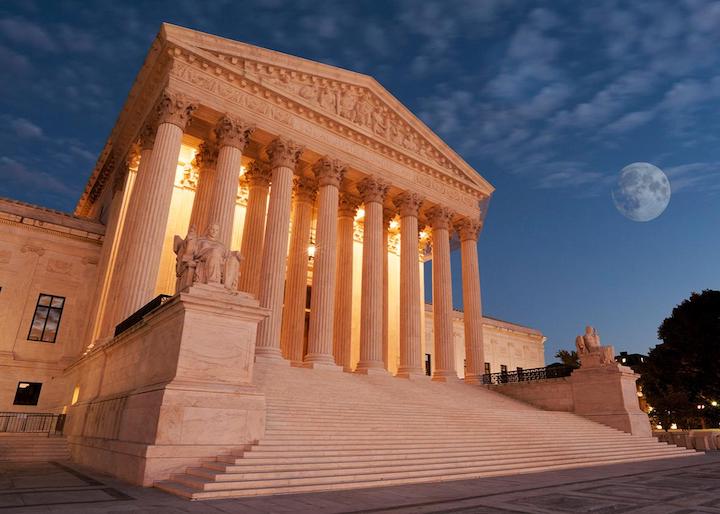The scene: Outside the Supreme Court of the U.S. in March 2014. I was on my way to the Court to take in the oral argument in the Hobby Lobby case.
The question was whether the Green family, owners of the Hobby Lobby stores – and providing already generous medical coverage to their employees – would be obliged, under Obamacare, to provide coverage for contraception and abortion. The family bore serious moral objections to abortion, reinforced by their religious convictions. Eventually, a closely divided Court would come down on the side of the Greens.
But outside the Court that day was a circus of demonstrators, including many young women who had left their sobriety at home. One of the more prominent signs said, “My employer should have nothing do with my contraception.” To which I thought: The Green family could not have agreed more.
But the scene sparked the question: How did we get to this point? Almost fifty years earlier, in the Griswold case, the Court had struck down a law barring the sale of contraceptives to married couples. That holding was soon extended to unmarried couples. In a kind of natural translation, a restriction of freedom by the law was regarded as “wrongful,” and so the action it restricted was translated as “rightful,” and from there the access to contraception was regarded as a “right.” And no less now than a “constitutional right.”
As that moral logic unfolded, that right was now incorporated in the souls of these young women outside the Court as: a “right” so deeply entwined with personal freedom that it was a “good” to be savored by every woman, even if someone else had to pay for it. This was not a matter of dollars and cents, for many women pay more for their smartphone than their contraception. More important than the charges levied on Mr. Green was the need to compel him to acknowledge the deep rightness of contraception and abortion.
I raise this matter now because we have seen the most curious reaction on the part of some conservatives as they have persistently lost in the courts on the issues of abortion, same-sex marriage, and “sexual orientation.” With the sense of losing in the “culture wars,” some conservatives have professed to turn away from politics and the courts, with the new, summoning line that “politics is downstream from culture.”

According to this argument, we’ve lost in the courts because we have lost in the culture, and so the object is to change the culture. But that line of argument misses at once what has been plainly before us: the Supreme Court, pronouncing with the authority of law on the things rightful and wrongful, has been the main Engine in the coarsening and corruption of our culture. And our friends miss this point because they have never absorbed Aristotle’s understanding, at the very beginning of political philosophy, on the necessary connection between the logic of morals and the logic of law.
The sensibilities of those young women outside the Court in March 2014 had been shaped by the moral dynamic unloosed by the Court on contraception. In the same way, the culture of pornography that now envelops us flowed inescapably once the Court took it upon itself to dismantle those laws in the States that offered a rough but useful restraint on the diffusion of pornography.
And in that vein, how do we explain that state of affairs in which people who have been to the priciest colleges affect no awareness of the facts of embryology on the offspring in the womb, and claim nothing less than a “right” to kill an innocent small human being, as it suits their own private interests?
As Aristotle recognized, a community governed by “law” springs directly from the nature of that creature quite given to reasoning and argument over matters of right and wrong. If we come to the judgment that it is wrong for a parent to torture a child, for whom is it wrong? The matter put forth as a moral question brings an answer in a moral voice: that it would be wrong, for anyone for everyone. And therefore, as reasoning went, we would be justified in forbidding that torture for anyone with the force of law.
When Congress passed the Civil Rights Act of 1964, it forbade racial discrimination even in private businesses open to transactions with the public as “public accommodations.” With that Act, the matter of racial discrimination was removed from the domain of private taste and treated as a matter of moral consequence and public obligation.
And sure enough, just a few years later, a heavy majority of the public in the South, as well as the North, had come to accept that teaching of the law. Had the culture of the South changed so dramatically, or did the change have something to do with the fact – as Aristotle long ago understood – that the law cannot help teaching moral lessons?
Many of our friends may have dreams of going off to make the films that reshape the moral sensibilities of the public. And I dearly hope they will. But it would be a foolish turning away from the deepest things we know if we lose the sense that it is utterly necessary for us to have something to “put on the table” for enactment or judgment, in legislatures and in courts. For in putting it on the table, we compel a discussion—and challenge people to think anew.
*Photo: Gary Blakeley/Thinkstock















